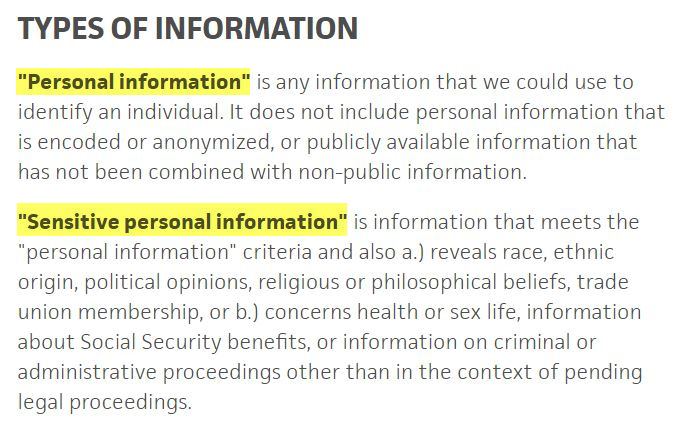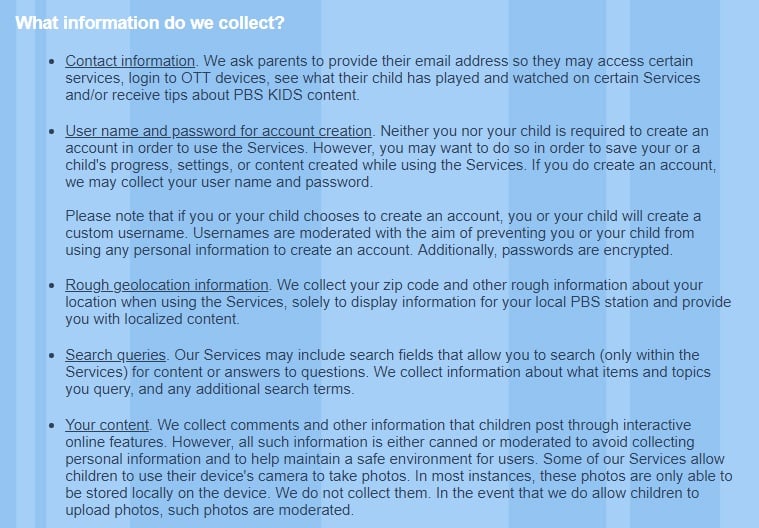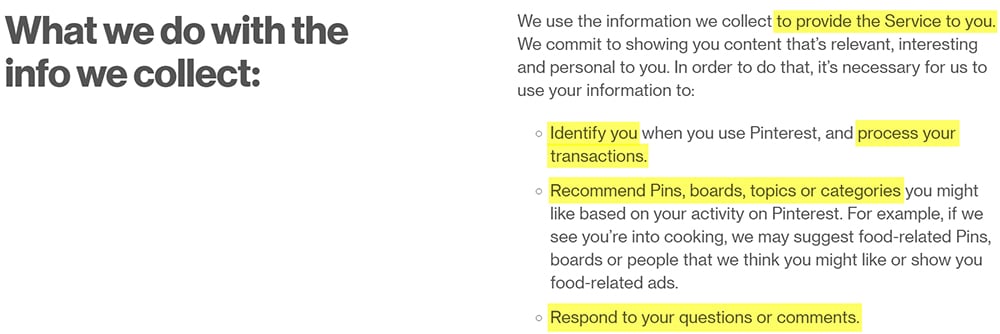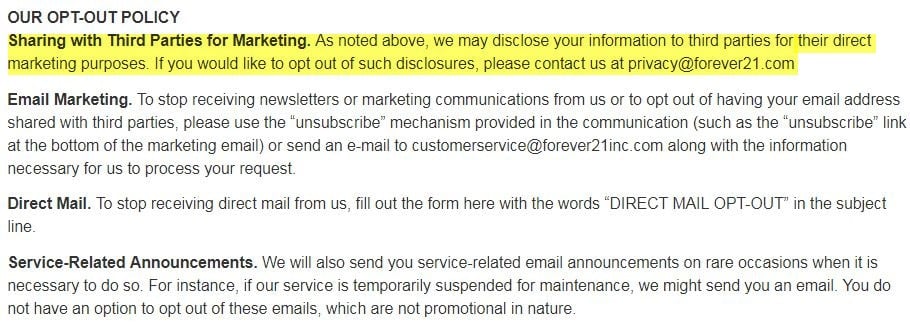Your Privacy Policy must be accurate and easily comprehensible, with all the necessary information required by laws and for transparency.
Generally speaking, every Privacy Policy agreement should have at least the following clauses:
- What information is collected and how
- How is the information used
- How is the information stored and protected
- Company contact information
- Use of cookies, log files and tracking
- How a user can opt out of data collection/usage
Here's each one in action.
What Information is Collected and How
Privacy Policy agreements inform users what information is collected from them. This includes information users voluntarily and actively provide when they register to use services, as well as information that may be collected from them automatically, such as through the use of cookies.
You can define how you classify information e.g. public, private, or personal information. This helps the user know exactly what these terms means in the rest of the Privacy Policy document.
Here's an example of how you can construct a clause to explain this information to your users:

The PBS Kids Privacy Policy informs users what information it collects from them. It describes the information it collects as well as a short but further detailed section after each type of information that provides more information:

How the Information is Used
One of the main purposes of Privacy Policy agreements is to explain to users how the information the business collects is used.
Pinterest has a fairly large section on What we do with the info we collect in its Privacy Policy agreement. In its first paragraph, it states that the website uses the information to provide its services to its users. It goes on to explain a few different ways it uses the information including to identify users, process their transactions, make recommendations, and respond to their questions and comments.

How the Information is Stored and Protected
Another important clause to include in your Privacy Policy agreement is about how you store and protect the information you collect from your site's visitors. You can explain the different ways you store information and what measures you take to protect that information.
For example, Caffe Nero's Privacy Policy agreement states that user account information is protected by a password and explains what steps users can take to prevent unauthorized access to their accounts.
In addition to this, it also states that the website takes steps to ensure as much security as possible, however it doesn't guarantee that the measures they take will prevent unauthorized access:

Shopify states in its Privacy Policy that it follows the industry's standards on information security management to protect sensitive user information. It also says that the company performs audits annually to make sure that the handling of user credit card information is in line with the industry guidelines. Finally, it says that they cannot guarantee the absolute security of their users' personal information since no method of transmission over the Internet is 100% secure.

Company Contact Information
As a business owner, it's important that you include your company's contact information in your Privacy Policy agreement. Generally, contact information is added at the end of the Privacy Policy and contains a physical (street) address, email address, and/or phone number. The more contact information that you can provide, the better.
The British Heart Foundation provides a Contact clause that includes a mailing address as well as an email address for getting in touch:

Use of Cookies, Log Files and Tracking
Websites and apps use cookies to store user information, provide users with personalized experiences and collect their users' web history. Other websites may make other uses of cookies and may even choose to give third parties access to those cookies.
In any case, website owners are required to inform their users about the tools the company uses to collect user information and track their behavior, including cookies.
Here's a look at how Discord addresses cookies usage in its Privacy Policy:

Most websites and app owners use log files to automatically collect and store information about their users' IP address, browser, data/time etc. and use it for different purposes.
Here's how AWeber explains how it uses the information collected from visitors using log files in its Privacy Policy agreement:

Note how it uses simple descriptions and clear terms to describe the use of these files, which is helpful since most people likely have no idea what these types of files are actually there to do.
Opt-Out Policy Clause
Apps and websites should inform their customers about their right to opt out of certain aspects or services offered by a website.
Forever 21's Privacy Policy, for instance, informs customers about their right to opt out of any of the company's services.

Note how the clause is broken up into many short parts with simple, clear instructions for each method of opting out.
